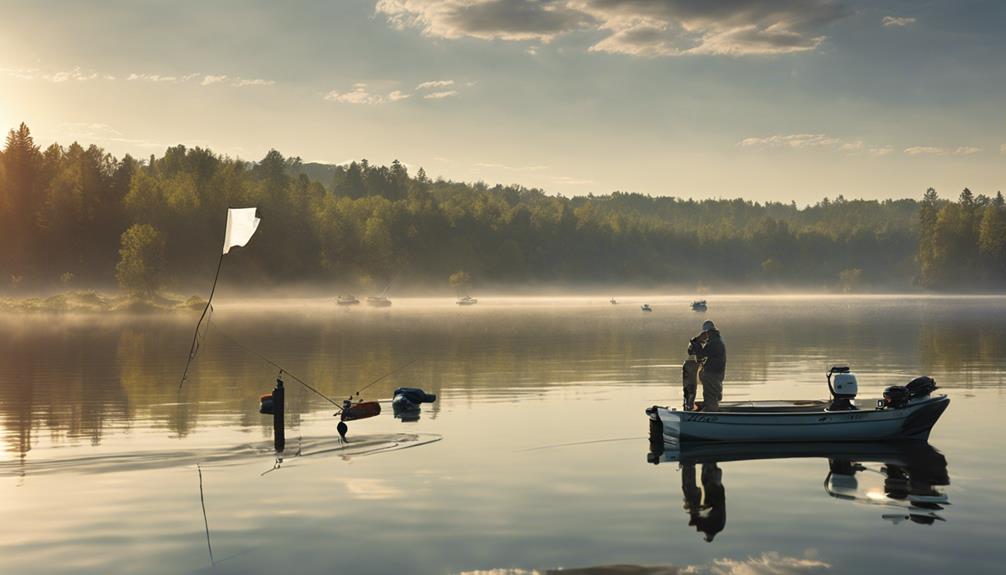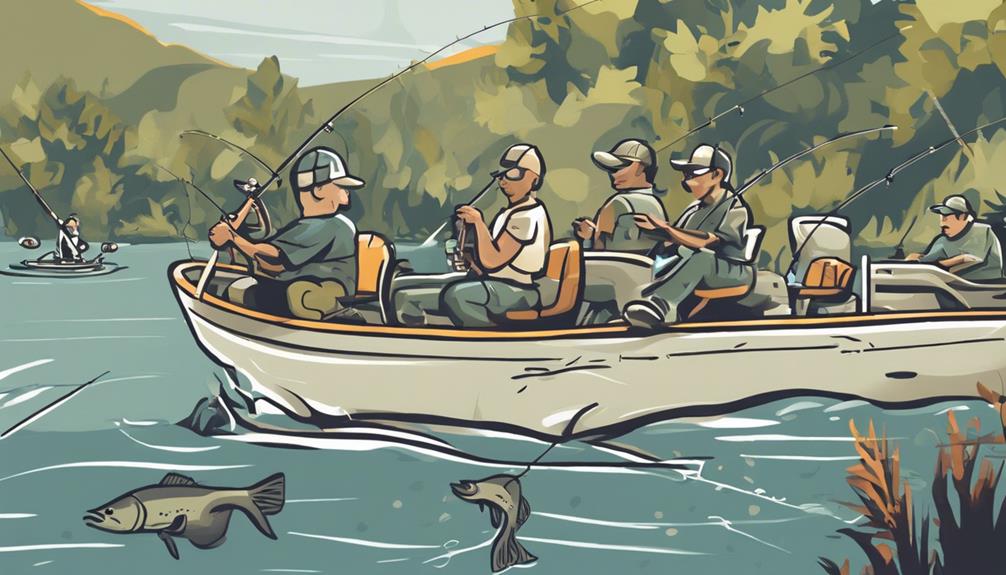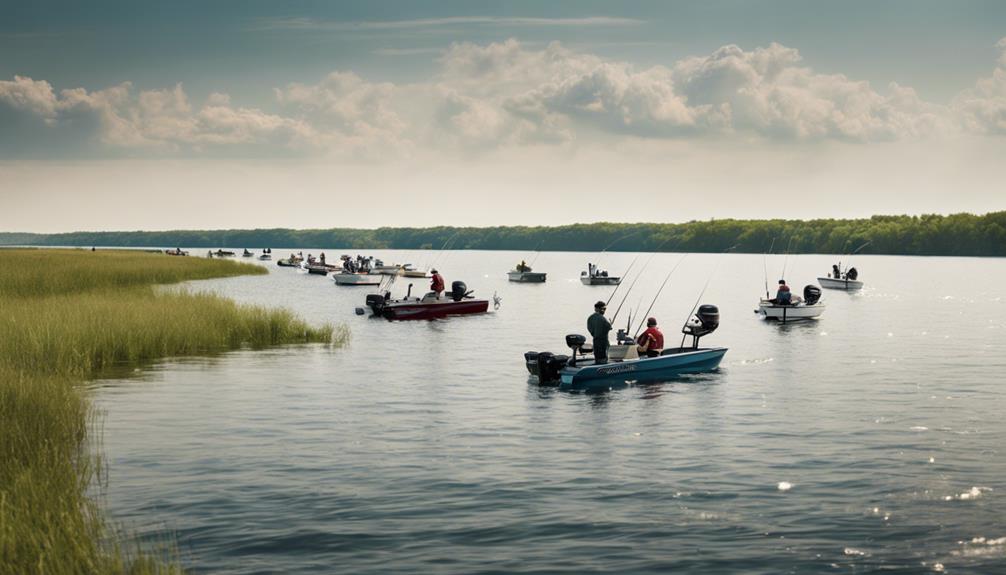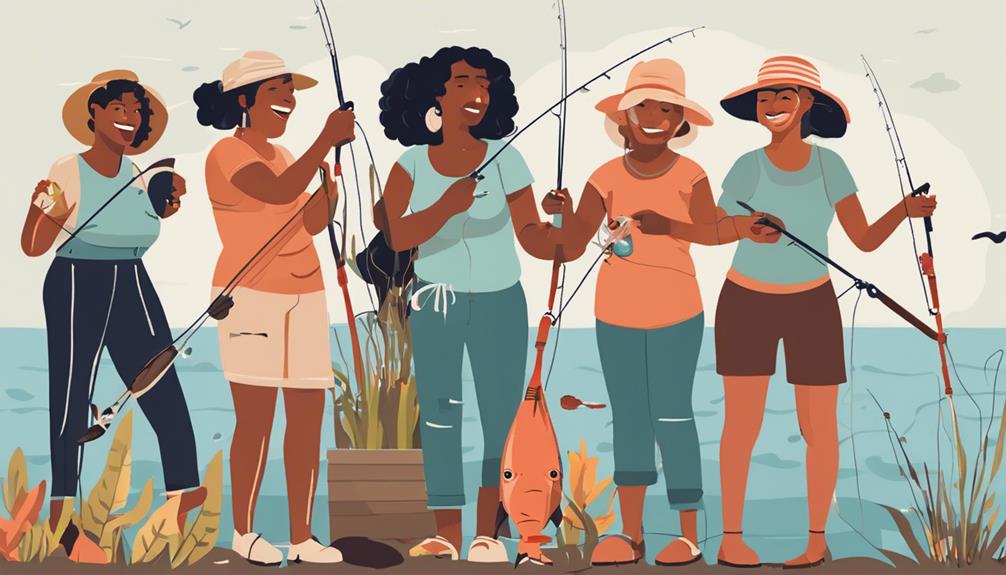Master freshwater lake fishing tournaments with these key tips: Select and maintain gear meticulously. Understand local fishing rules and boundaries. Scout fishing spots and strategize smartly. Hone your casting precision and technique. Use live bait wisely for better results. Handle caught fish with care and release them gently. Connect with other anglers for valuable insights. These essential approaches can heighten your chances of success and enrich your competitive fishing experiences.
Choosing the Right Gear
When preparing for freshwater lake fishing tournaments, selecting the appropriate gear is crucial for maximizing your chances of success. Gear maintenance is paramount. Ensure your equipment is in top condition by checking for any signs of wear and tear. Clean and lubricate reels, replace any damaged parts, and organize your tackle box efficiently for easy access during the tournament.
Proper equipment selection is key. Choose the right tackle based on the fish species present in the lake. Research the best lures, baits, and hooks to use for the specific fish you're targeting. Make sure you have a variety of options to adapt to different conditions. Your fishing line is your direct connection to the fish. Select the appropriate line weight and type based on the size of the fish you expect to catch. Consider the water clarity and cover when choosing the line strength.
Organize your gear systematically. Have separate compartments in your tackle box for different types of lures, hooks, weights, and other accessories. This will save you time and prevent frustration during the tournament. Keep your gear well-maintained throughout the fishing season to ensure it performs optimally when you need it the most. By paying attention to gear maintenance and proper selection, you set yourself up for a successful freshwater lake fishing tournament.
Understanding Local Regulations
To ensure a smooth and compliant fishing experience during freshwater lake tournaments, familiarize yourself with the local regulations governing the area. Understanding boundaries and following rules is crucial to avoid penalties or disqualification. Start by checking the specific rules set by the tournament organizers, as they may have additional regulations beyond what's required by the local authorities.
Local regulations typically cover aspects such as fishing boundaries, permissible fishing methods, size and bag limits for different species, and any restricted areas where fishing is prohibited. Pay close attention to designated boundaries to avoid accidentally fishing in off-limits areas. Violating these boundaries can result in point deductions or even expulsion from the tournament.
Make sure to have a copy of the regulations with you at all times during the tournament. Familiarize yourself with the rules beforehand, and if anything is unclear, don't hesitate to ask the organizers for clarification. Remember that ignorance of the rules isn't an excuse, so it's essential to be well-informed to ensure a fair competition for all participants.
Identifying Key Fishing Spots
Explore the freshwater lake thoroughly to pinpoint key fishing spots that promise abundant catches and strategic advantages during tournaments. To maximize your chances of success, consider the following tips:
- Mapping Underwater Structures: Use a fish finder or depth finder to locate underwater structures such as submerged rocks, weed beds, or drop-offs where fish tend to congregate. These areas provide shelter and ambush points for fish.
- Utilizing GPS Coordinates: Marking GPS coordinates of productive spots allows you to revisit them easily, ensuring you don't miss out on prime fishing locations.
- Studying Fish Behavior: Observe how fish move and behave in different conditions. Understanding their habits can help you predict where they'll be at different times of the day.
- Analyzing Feeding Patterns: Pay attention to the natural food sources available in the lake and how fish interact with them. Identifying feeding patterns can guide you to areas where fish are actively feeding.
- Exploring Less-Fished Areas: Don't overlook spots that are often ignored by other anglers. Sometimes, less-fished areas can hold hidden gems and offer a higher chance of landing trophy fish.
Perfecting Your Casting Technique
Having identified key fishing spots around the freshwater lake, your success in tournaments hinges greatly on perfecting your casting technique. To excel in casting, focus on two vital aspects: reel control and distance accuracy.
Reel control is essential for a successful cast. Start by gripping the rod firmly but comfortably. Use your dominant hand to hold the rod and the other to control the reel. Before casting, ensure the reel is properly adjusted to avoid tangles. As you swing the rod back, smoothly release the line using your thumb to control its flow. Mastering this technique will improve your casting distance and accuracy.
Distance accuracy is crucial for reaching specific fishing spots. Practice casting at varying distances to develop a feel for how much force is needed. Pay attention to your body positioning; stand with your side facing the target and shift your weight from the back foot to the front as you cast. The motion should be a fluid, controlled movement rather than a jerky one. By honing your distance accuracy, you'll be able to place your bait precisely where the fish are lurking.
In fishing tournaments, perfecting your casting technique can make a significant difference. With dedication and practice, you'll enhance your reel control and distance accuracy, increasing your chances of landing that prized catch.
Utilizing Live Bait Effectively
Mastering the art of utilizing live bait effectively is a key skill that can significantly enhance your success in freshwater lake fishing tournaments. To maximize your chances of landing the big catch, consider the following tips:
- Bait Presentation: How you present your live bait can make a huge difference. Make sure it looks natural in the water to entice the fish.
- Hook Size: Choosing the right hook size is crucial. If it's too big, the fish may not bite; if it's too small, you mightn't hook them effectively.
- Water Temperature: Pay attention to the water temperature as it affects fish behavior. Some fish species are more active in warmer water, while others prefer cooler temperatures.
- Fish Behavior: Understanding the behavior of the fish in the lake can help you decide how to best utilize live bait. Different species have different feeding habits and preferences.
- Experimentation: Don't be afraid to try different live baits and techniques. Sometimes what works one day may not work the next, so be open to changing your approach.
Staying Patient and Persistent
To succeed in freshwater lake fishing tournaments, maintaining patience and persistence throughout your fishing expedition is paramount.
Patience is key when it comes to freshwater lake fishing tournaments. Fish can be elusive, and it may take time to locate the best spots where they're actively biting. Avoid the temptation to constantly change locations if you haven't had immediate success. Instead, stay patient, and give each spot enough time to prove its worth. Developing a strategic approach based on the behavior of the fish in the lake can significantly increase your chances of success. Observation and adaptability are crucial components of this strategy.
Persistence is equally important in these tournaments. Even if you haven't had a bite in a while, maintaining focus and continuing to cast your line with determination can make all the difference. Remember, fishing tournaments are as much about endurance as they're about skill. Keep your focus sharp, and don't let temporary setbacks discourage you. By staying persistent and maintaining your focus, you increase the likelihood of landing that prized catch. So, keep a clear mind, stick to your strategy, and fish with unwavering persistence until the very end.
Handling Fish With Care
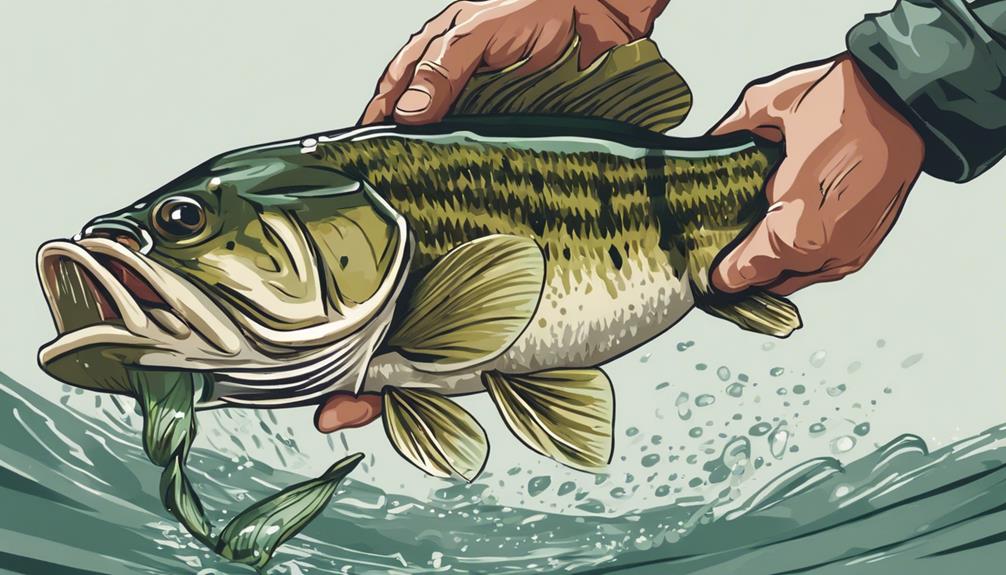
Ensure that you handle fish with care to minimize stress and potential harm to the fish during freshwater lake fishing tournaments. Proper fish handling and release techniques not only demonstrate good sportsmanship but also contribute to the conservation of fish populations for future generations.
Here are some essential tips to help you handle fish with care:
- Use barbless hooks: Opt for barbless hooks to make unhooking easier and less stressful for the fish.
- Keep the fish in the water: Minimize the time the fish spends out of the water to prevent unnecessary stress and reduce the risk of injury.
- Avoid squeezing the fish: Refrain from squeezing the fish tightly, as this can damage internal organs and harm the fish.
- Support the fish properly: When holding a fish, provide adequate support to its body, especially under the belly, to avoid injuring its spine.
- Release the fish gently: Once you're ready to release the fish, place it back in the water, supporting it until it swims away on its own.
Networking With Fellow Anglers
Networking with fellow anglers enhances your fishing experience by providing opportunities to share knowledge, strategies, and camaraderie on the water. Building relationships with other anglers can lead to a wealth of shared experiences and insights that can significantly improve your skills and enjoyment of the sport. When you engage with other anglers, you open yourself up to a world of fishing techniques and stories that can inspire and educate you in ways you never imagined.
Sharing techniques with fellow anglers can be a game-changer. You may discover new baiting methods, casting techniques, or innovative ways to navigate different fishing conditions. These insights can help you adapt and refine your own approach, ultimately leading to more successful fishing outings. Additionally, swapping stories with other anglers can be both entertaining and enlightening. You might learn about the biggest catch of someone's fishing career or hear about the one that got away, creating a sense of camaraderie and connection among anglers.
Frequently Asked Questions
How Can I Prevent My Fishing Line From Getting Tangled?
To prevent your fishing line from getting tangled, focus on line maintenance and knot tying. Keep your line clean and free of debris, and regularly check for any signs of wear or damage.
When tying knots, make sure they're secure and snug to avoid slipping. Additionally, practice good rod control and casting techniques to minimize line twists and snags.
What Should I Do if I Accidentally Hook a Fish Too Deeply?
If you accidentally hook a fish too deeply, remember to stay calm. Use proper dislodging techniques by gently trying to remove the hook.
If the hook is deeply embedded, consider emergency extraction tools or techniques. It's crucial to prioritize the fish's well-being, so if you're unsure, it's best to seek assistance from a professional or experienced angler to ensure the fish is safely released back into the water.
Are There Any Specific Techniques for Fishing in Murky Water?
When fishing in murky water, it's crucial to adjust your techniques effectively. Opt for brightly colored or noisy lures to attract fish in low visibility conditions.
Experiment with different retrieval speeds and depths to find what works best. Try using rattling lures or those with exaggerated movements to grab attention.
Stay patient and vary your lure selection until you find what triggers a strike in the murky waters.
How Do I Handle Unexpected Weather Changes During a Tournament?
When unexpected weather changes hit during a tournament, stay prepared with proper gear and weather strategies. Make sure you have the right clothing and equipment for varying conditions.
Keep an eye on the forecast and adapt your fishing techniques accordingly. Stay safe by seeking shelter if needed and being aware of any lightning risks.
Being flexible and ready for any weather curveballs will help you stay focused and competitive during the tournament.
Is It Beneficial to Use Scents or Attractants on My Bait?
Using scents or attractants on your bait can be beneficial in freshwater lake fishing tournaments. Bait preferences vary among fish species, so it's essential to choose scents that match their preferences. Applying attractants properly can increase the effectiveness of your bait, enticing more bites.
Benefits include attracting fish from a distance and masking any unnatural scents that could deter them. Experiment with different scents and application methods to find what works best for you.
Conclusion
In conclusion, by following these essential tips for freshwater lake fishing tournaments, you can greatly improve your chances of success.
Choosing the right gear, understanding regulations, identifying key fishing spots, perfecting your casting technique, utilizing live bait effectively, staying patient and persistent, handling fish with care, and networking with fellow anglers are all key components to a successful tournament experience.
Remember to stay focused, adapt to changing conditions, and enjoy the thrill of the competition. Good luck out on the water!
